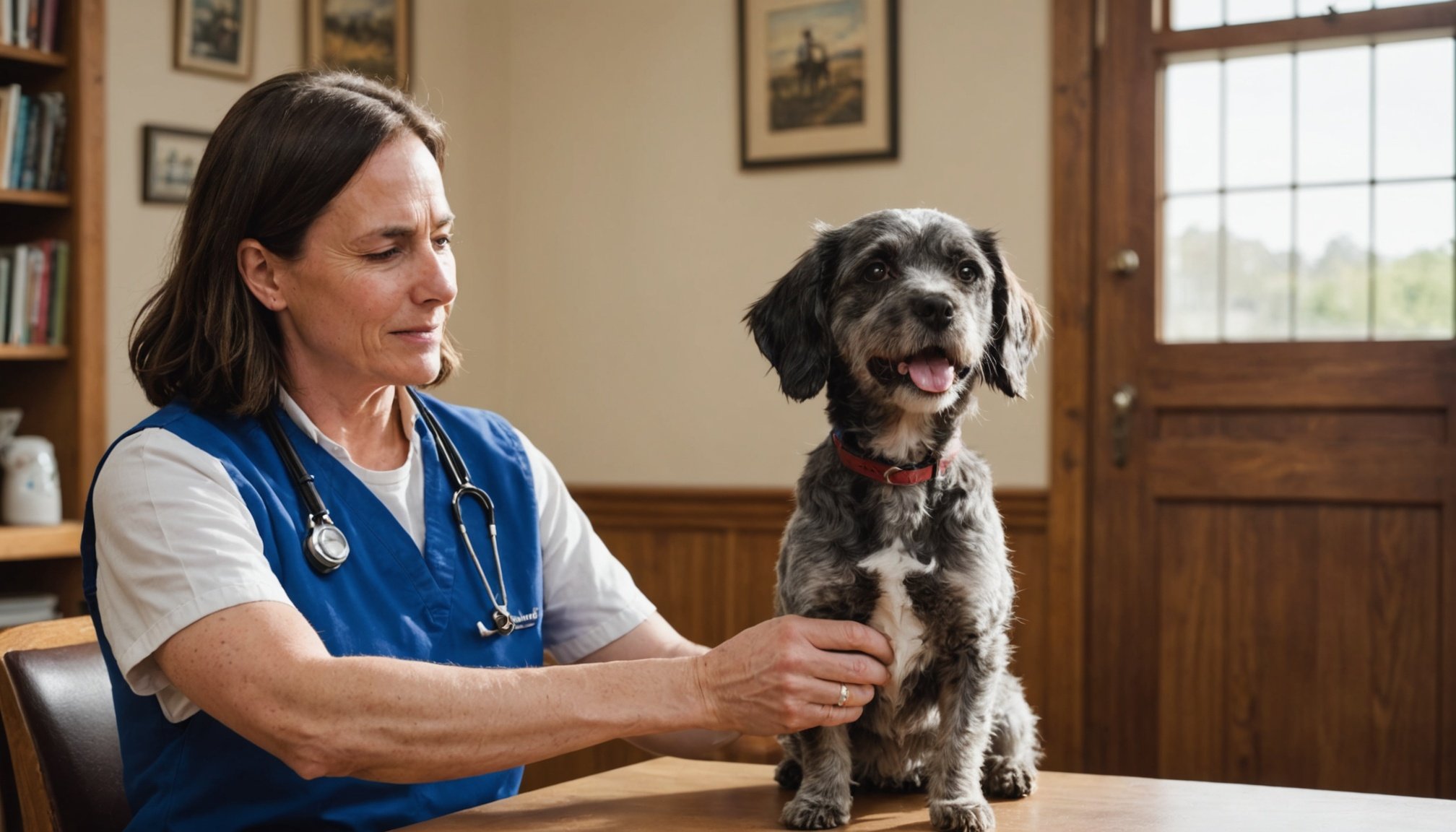Importance of Pet Vaccinations
Vaccinations play a crucial role in safeguarding pet health by preventing serious diseases. They work by stimulating the animal’s immune system to produce a response similar to that of the natural infection, creating immunity without the risks associated with the disease itself.
Disease prevention is one of the most significant benefits of vaccinating pets. Many vaccines protect against life-threatening conditions such as rabies, distemper, and parvovirus. These illnesses not only endanger pets but can also have serious health implications for humans and other animals. The spread of these diseases is significantly reduced through consistent and comprehensive vaccination programs.
Also to read : Selecting the Perfect Pet to Thrive in Uncertain Times: A Comprehensive Guide
Statistics point to a noteworthy reduction in disease prevalence thanks to widespread vaccination. For instance, rabies cases in pets have drastically decreased due to vigilant vaccination practices. Thus, regular vaccinations are vital not only for individual pets’ health but also for the broader community well-being.
Overall, vaccinations foster enhanced pet health, significantly reducing the chances of disease and contributing to a longer, healthier life for pets. Regular consultations with veterinarians can help pet owners keep their pets up-to-date with their vaccinations, ensuring optimal disease prevention and health maintenance.
Also read : Unleash Success: A Comprehensive Positive Reinforcement Guide to Training Your Dog to Roll Over
Types of Pet Vaccines
Vaccinations for pets are classified into two categories: core vaccines and non-core vaccines. Knowing these types helps pet owners make informed decisions regarding their pet’s health.
Core Vaccines
Core vaccines are deemed essential for all pets due to the prevalence and severity of diseases they prevent. These include shots for rabies, distemper, and parvovirus. Rabies vaccination is critical not only for pet health but also for preventing disease transmission to humans. Vaccination typically begins when pets are puppies or kittens, usually between 6 to 8 weeks old. Booster shots ensure continued protection throughout a pet’s life.
Non-Core Vaccines
Non-core vaccines are optional and tailored to a pet’s lifestyle and environment. For example, vaccines may protect against Lyme disease or kennel cough. Pet owners should weigh risks against benefits when deciding on these. An outbreak in a particular region may necessitate certain non-core vaccines, highlighting the importance of consulting with a veterinarian. This personalized approach ensures comprehensive health coverage, integrating vaccination types to enhance overall well-being.
Potential Risks and Side Effects
While pet vaccinations are essential for disease prevention, it is important to be aware of potential risks. Most pets experience mild side effects, such as slight fever, decreased activity, or minor swelling at the injection site. These reactions generally resolve within 48 hours.
However, rare but serious reactions may occur, including vomiting, diarrhoea, or difficulty breathing. In extreme cases, an allergic reaction can cause anaphylaxis, requiring emergency veterinary intervention. Recognising symptoms such as persistent vomiting, swelling, or difficulty breathing is crucial in these situations.
Consultation with a veterinarian is imperative to understand the risks associated with vaccinations. Veterinarians provide guidance tailored to your pet’s health history, ensuring their safety and well-being. They can also help discern whether certain pre-existing conditions may necessitate vaccine adjustments.
Ultimately, while the risks exist, the overall safety profile of pet vaccinations is robustly supported by extensive research. Regular evaluations and consultations with veterinarians can address concerns, ensuring pet safety and maintaining their health. Understanding these aspects can help manage any potential side effects effectively, offering peace of mind while safeguarding against serious diseases.
Expert Opinions on Vaccination
Pet vaccinations are highly supported by various veterinary organizations. Institutions such as the American Veterinary Medical Association emphasize vaccinations as a cornerstone of preventive health. Veterinarians widely advocate for adherence to recommended vaccination schedules, as they are meticulously tailored to enhance pet health and shield against prevalent diseases.
Veterinary Insights
Veterinary experts often share positive anecdotes regarding vaccination outcomes. Pets receiving timely vaccinations are less prone to contracting severe diseases, contributing to a decrease in veterinary emergency visits and ensuring safer interactions with other animals and humans. Such positive experiences fortify trust in established vaccination guidelines.
The role of vaccination in promoting long-term pet health cannot be overstated. Regular vaccinations not only bolster immunity but also prevent the re-emergence of once-common illnesses. Through expert advice and proactive vaccination, pets lead healthier and longer lives, underscoring the veterinary advice as an imperative part of maintaining overall well-being.
Incorporating vaccinations into a regular health routine reflects a responsible approach to pet care, with veterinarians being instrumental in guiding pet owners. Enabling a healthier pet population contributes to a robust and resilient community environment.
Vaccination Schedule for Pets
Creating a well-structured vaccination schedule is crucial for maintaining optimal pet health. Starting vaccinations promptly ensures pets begin their lives with strong immune defenses. Puppies and kittens typically begin their vaccination journey between 6 to 8 weeks of age. Timely receipt of initial vaccines sets a solid foundation for disease prevention.
The significance of booster vaccinations lies in maintaining immunity, often required annually or triennially, depending on the vaccine. These boosters fortify the pet’s immune response, contributing significantly to continued health. Adjustments in the vaccination schedule may be necessary based on individual health circumstances or changes in local regulations.
A tailored pet health plan that aligns with regional disease risks and the specific needs of the pet is paramount. Continuous collaboration between pet owners and veterinarians facilitates necessary adjustments to vaccination protocols, ensuring pets remain shielded from prevalent local threats.
This partnership not only helps in keeping to the recommended timeline but also enriches the overall health strategy for pets, allowing pet owners to make informed decisions in the best interests of their companions’ well-being.
Impact of Vaccinations on Public Health
Pet vaccinations significantly influence public health by controlling the spread of zoonotic diseases—those transmissible from animals to humans. A well-vaccinated pet population serves as a barrier against outbreaks, protecting not just individual pet health but also community health. For instance, rabies, a deadly virus affecting all mammals, is effectively managed through comprehensive vaccination programs among pets, significantly lowering human infection risks.
Besides rabies, vaccinations target various diseases with zoonotic potential, like leptospirosis and toxoplasmosis. By curbing these diseases in animals, the risk of transmission to humans decreases, highlighting the indispensable role of vaccinations. Public campaigns boosting vaccination adherence further reinforce these protective measures, showcasing the power of coordinated health efforts.
The success of such initiatives can be seen in marked reductions of certain diseases over time. Vaccination campaigns not only protect individual animal health but also adjust the trajectory of disease prevalence in broader public health terms. This collaboration between veterinary and public health sectors exemplifies a unified approach to health management, ensuring resilient communities against potential zoonotic threats.
Common Misconceptions About Pet Vaccinations
Despite the overwhelming evidence supporting vaccination importance, several myths persist. One common misconception is that pets don’t need vaccinations if they remain indoors. However, even indoor pets can be exposed to diseases through indirect contact or during routine veterinary visits. Thus, vaccinations are crucial for maintaining overall pet health.
Misinformation regarding vaccine schedules is another prevalent issue. Some pet owners believe one or two vaccinations are sufficient for a lifetime. In reality, maintaining disease prevention requires adherence to scheduled vaccinations, including booster shots. These schedules are not arbitrary but carefully designed to sustain immunity levels throughout a pet’s life.
Another myth is that administering numerous vaccines can overwhelm an animal’s immune system. On the contrary, vaccination types support the immune system by preparing it to recognize and combat pathogens effectively. Herd immunity is also significant; when a large portion of a population is vaccinated, the spread of disease is greatly minimized. This concept is as relevant to pets as it is to humans, emphasizing community health’s reliance on widespread vaccination adherence. Educating pet owners about these facts helps dispel myths and ensures pets lead healthier, protected lives.










